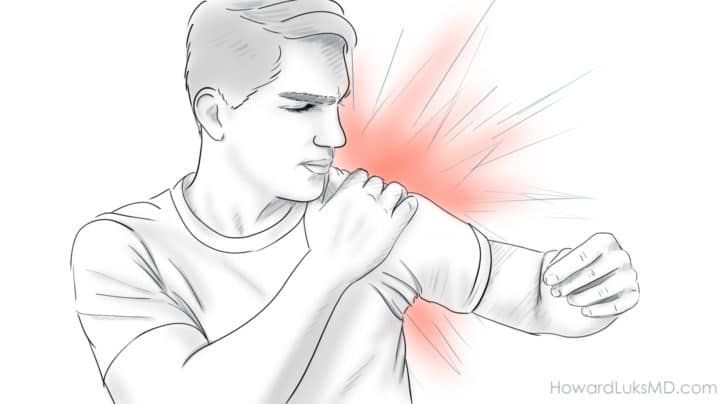
Shoulder injuries can be serious. How can you tell? When do you need to consider seeing a doctor after you injured your shoulder?
Let’s say you fell on your shoulder and heard a pop. Now you now notice a bump on top of your shoulder. Is this a serious shoulder injury?
Some of you fell or landed on your arm and now you can’t move it. Does that motion improve over the next few days as your shoulder pain improves? How do you know if your shoulder injury is serious and if you need to see a Sports Medicine professional?
Perhaps you simply woke up and your shoulder hurts? Spontaneous shoulder pain is actually common after 40. Often times we can ignore mild spontaneous shoulder aches and see if it will get better on its own.
Wait and see might be a good strategy for most of you, but it might be a bad idea for those of you with severely compromised shoulder function after a fall. How can we tell who needs to have their shoulder seen by an expert sooner rather than later?
When should you see a doctor after a serious shoulder injury?
Because of the complexity of the shoulder joint, there are many different structures that can be injured. Let’s work through some of the more common injuries, then we will try and help you determine if you need to head out to see a doctor.
Our shoulder is a highly complex joint. To function properly, the muscles, or rotator cuff need to function properly. We have 4 rotator cuff tendons. Small rotator cuff tears involving only one tendon are typically not large enough to compromise function. Some of you may have terrible pain, but no tear. Some of you may have large rotator cuff tears but have very little pain. Pain does not correlate with the size of a rotator cuff tear.
Your shoulder joint is wonderfully constructed. It can remain stable but allows you to move it all-around in space. Between the two bones of the shoulder, we have a labrum or a cartilage disc which helps maintain the stability of the shoulder. Injuries to the labrum can cause issues with instability or a dislocation of the shoulder. To stay in place and not dislocate, the cartilage labrum and ligaments must be functioning well.
Now, many of us over 40 have labral tears as a result of wear and tear. Therefore, all labral tears do not produce a shoulder dislocation. However, if you fall and dislocate your shoulder, most shoulder dislocations will cause a labral tear. Those large, acute labral can make future dislocations more likely. Degenerative labral tears associated with aging do not lead to shoulder dislocations.
Our shoulder motion is controlled by a number of very important muscles. Those muscles are called the rotator cuff. The rotator cuff is a series of 4 muscles/tendons that collectively allow the shoulder to move.
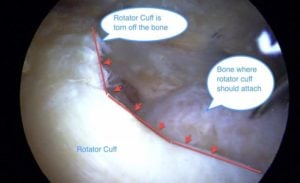
What are the signs to look for to know whether or not you have a serious shoulder injury?
Shoulder Weakness is a sign of a serious shoulder injury

The most common cause of severe weakness in the shoulder after a fall or injury is a massive rotator cuff tear. That is usually a tear that involves at least two of the four rotator cuff tendons.
Weakness after a fall is more commonly seen in people over 40. Massive rotator cuff injuries after a shoulder injury are also more commonly seen in people over 40, although they can occur in younger people too.
After a fall on your side or with your arm outstretched you can put enough force on the shoulder to rupture or tear the rotator cuff. Small tears of the rotator cuff typically do not produce weakness. Large tears of the rotator cuff, however, do cause weakness. A fall on the shoulder which leads to significant weakness when trying to use your arm should lead you to see a doctor. More information on rotator cuff injuries here.
Shoulder Instability
Shoulder instability or a shoulder dislocation can occur after a shoulder injury. If you fell with your arm outstretched, or if you fell hard on the side of your arm there is a chance that your shoulder dislocated. Some shoulder dislocations spontaneously go back into place or reduce. Some people with a shoulder dislocation will need to have the shoulder reduced, or put back into place in an emergency room.
Not all shoulder dislocations have to go to the emergency room to be put back into place. Many of you will feel as if the shoulder slid out of place when you hit the ground. Some of you will feel the shoulder slide back into place when you try to get up from the ground. If you feel as if the shoulder came out or slid back into place you should see a doctor.
If your shoulder slid back into place on its own, you do not need to go to the emergency room, but you should schedule an appointment to see a shoulder specialist. More info on shoulder instability and dislocations here.
If you are over 50 and had a shoulder dislocation, your shoulder was put back into place, but you have severe weakness then you may have sustained a large rotator cuff tear or an injury to a nerve in the shoulder which is causing the muscle weakness. Shoulder dislocations in people over 50 are often associated with tears of the rotator cuff, in addition to the labrum. These are both issues that should be evaluated by a shoulder specialist in their office, sooner rather than later. Most of these nerve injuries resolve on their own. Most massive traumatic rotator cuff tears will need to be repaired surgically.
You Heard A Pop In Your Shoulder
If you fell onto your shoulder and heard a loud pop and are now experiencing severe pain and weakness you could have torn your rotator cuff or labrum, or you could have an AC Joint separation. A pop in the shoulder, accompanied by severe pain, a bump on the top of the shoulder or weakness when trying to lift the arm should be a prompt to schedule a visit to see a shoulder doctor. These are not necessarily reasons to head out to an emergency room.
You See A Bump On Top Of Your Shoulder
After a fall or a heavy check into the boards while playing hockey you may notice a bump on the top of your shoulder. This is always accompanied by severe pain on the top of the shoulder. This could indicate an injury to the AC Joint or a shoulder separation. Most of these AC separations do not require surgery, but they should be evaluated by a doctor to determine which type of AC separation you have. Knowing which type of AC separation you have will determine if it is a serious shoulder injury, or if it will recover over time on its own.
These bumps do not necessarily require a trip to the emergency room, but they should be evaluated by a shoulder surgeon.
Pain over the Collarbone or Clavicle.
A fall onto your shoulder can transmit the force of the fall to your collarbone. This can result in a fracture of the collarbone or clavicle. You may or may not notice a bump over your clavicle, but you will have severe pain in that region. While many clavicle fractures will heal well without surgery, it is important to know what type of clavicle fracture you have and whether or not surgery presents itself as a reasonable option to consider.
Clavicle fractures are not emergent. Even if it a fracture that might require surgery, it is not emergent. If you suspect a fracture of the clavicle, you should consider a visit to an urgent care center, or a shoulder surgeon.
Many shoulder injuries can be serious. The earlier they are evaluated by a sports medicine professional the better the chance you have at a successful return to sports. Hopefully, these 5 signs of things to look for to know if you have a serious shoulder injury are beneficial. Most of these injuries do not require a trip to the emergency room. The majority can be managed by an urgent care center, or a visit to a sports medicine or shoulder doctor.
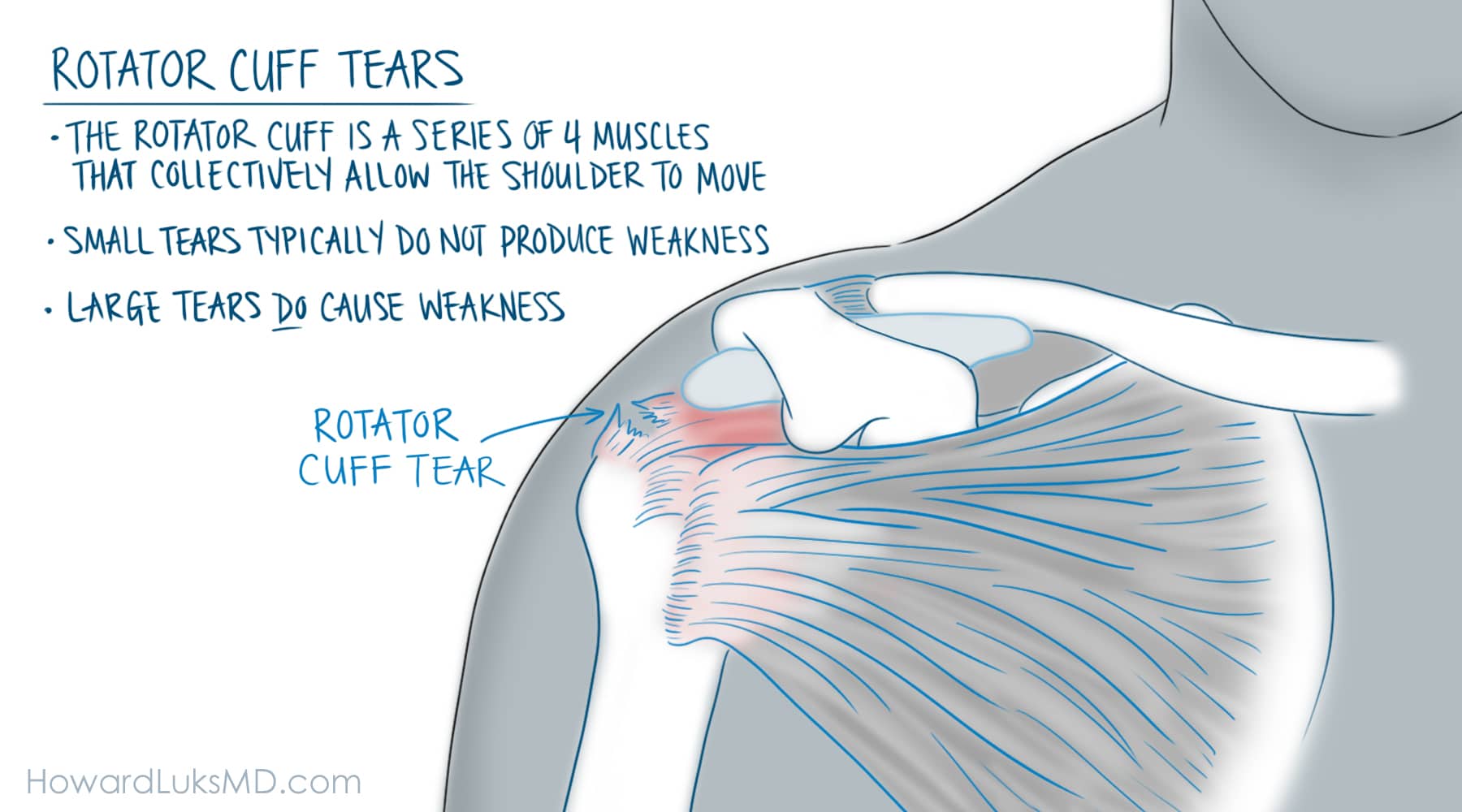
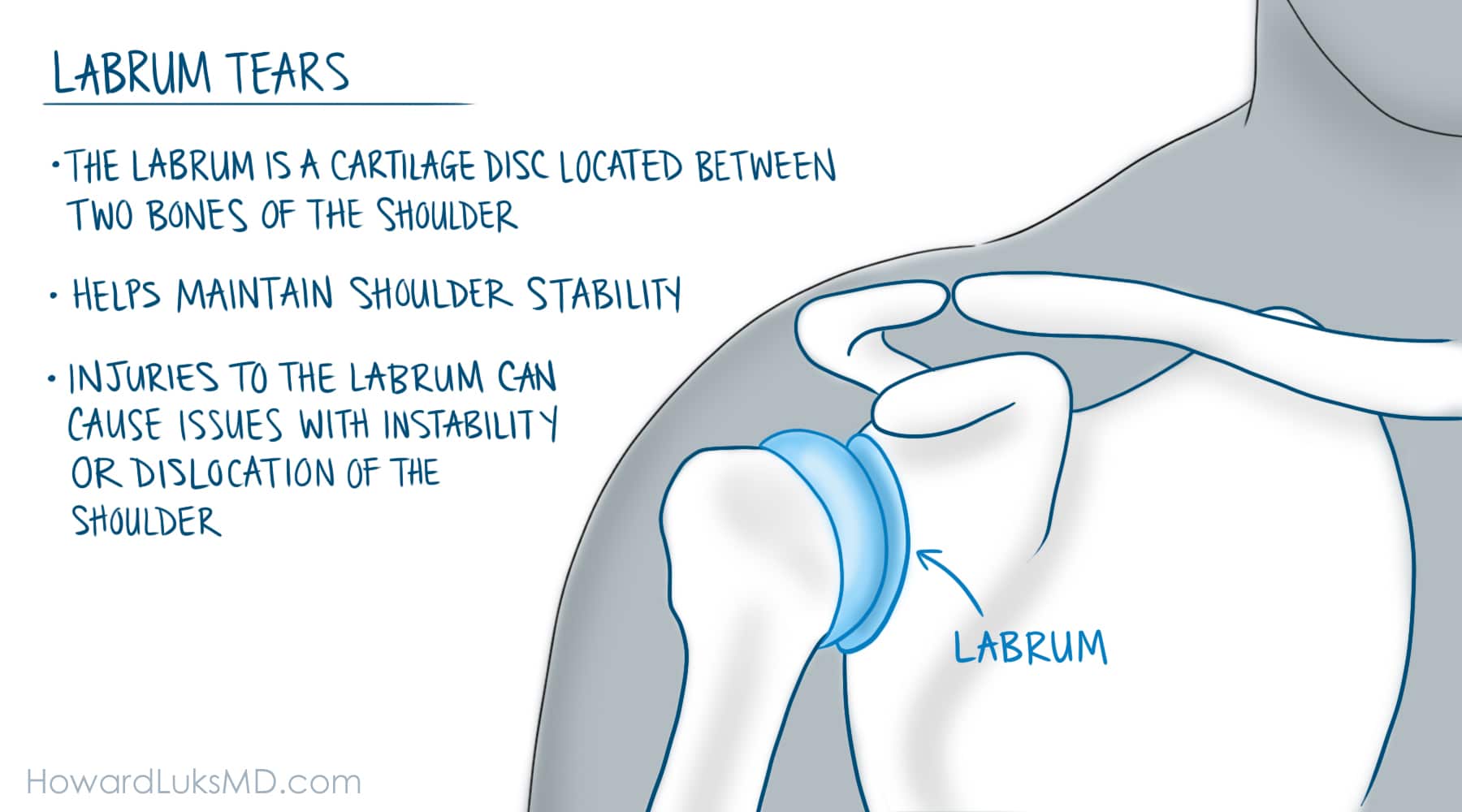
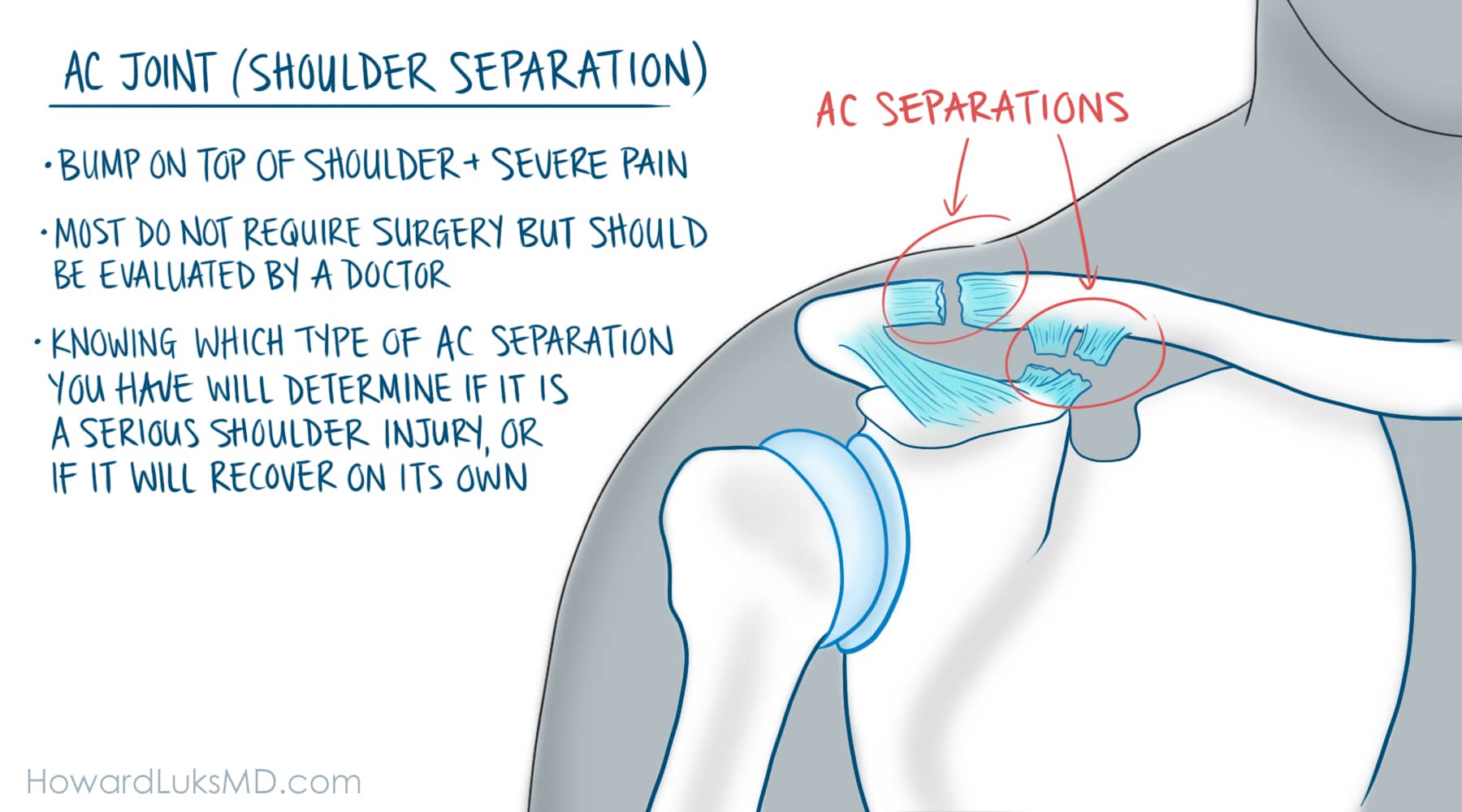


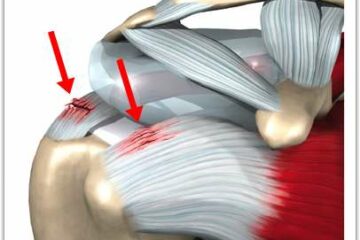

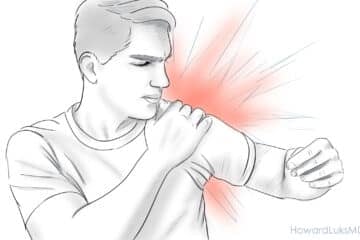
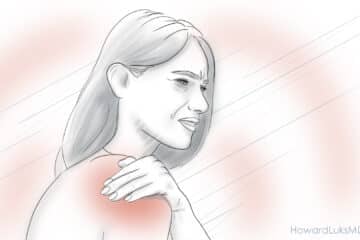








Hello, I have a type 3 shoulder separation. I have gotten xrays done already, however, my appointment with an orthopedist is not until after 3 weeks of the injury. Will my shoulder not heal correctly if this is a serious injury requiring surgery? (So far, I just have my arm in a sling). Any info helps thanks!
Your surgeon will not be able to reduce your AC separation. The bump will stay there.So the 3 week wait shouldn’t affect you. We typically do not operate on many Type III AC separations anymore. Only those that remain ‘unstable’.
Good luck !
Hi doc, I am sure I have a type IV type 4 ac separation with very high displacement. I am quite sure a complete tear now. If I have no surgery, will The pain ever stop, it’s been three months of pain, thanks for your info,
It’s hard to say… I would need to examine you to confirm your suspicions.
I have shoulder pain and when I move my arm away from my body laterally horizontally I hear a pop along with pain . Then on top of the shoulder posterior right on the joint if you press on it there is pain kinda on the ligament ? It’s been like this for months and I’m wondering if I should see someone for this problem ? What do you think the problem is, I know it’s hard to diagnose this problem via email however just take a guess.
Thank you
Sheila Pruitt
Most common cause of pain at our age is rotator cuff tendinosis We can also have small degenerative tears and bursitis too.
Other causes include arthritis and calcific tendonitis… less common cause of pain though.
I got a blow to my right shoulder in football, cannot lift my arm with shoulder what so ever, a lot of pain is in deltoid tissue when I try to lift it, also when I try to lift it nothing happens
Hi Jack …
In young athletes the pain might be due to a spontaneously reduced shoulder dislocation- that’s where the shoulder came out of place and then went back in on its own. It is painful and will limit your ability to move it. Fractures of the end of the clavicle can also happen. You should strongly consider seeing a doctor and at least have an X-ray to make sure that the shoulder is in its normal position. Your doctor can determine if more tests are needed.
Good luck.